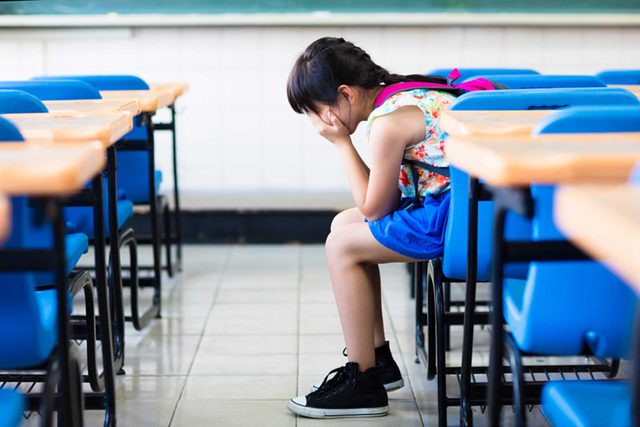
A reluctance to go to school in the morning
Because school is a hot spot for bullying, a child’s reluctance to wake up and head out in the morning could signal that something is amiss. With younger children, watch for recurring excuses to stay home, such as aches and pains, or frequent calls from the school nurse requesting an early pickup. With adolescents and teens, check in with teachers periodically to monitor attendance, as this age group is more likely to skip school altogether. Donna Clark-Love, a school bullying expert and prevention advisor in Houston, Texas, suggests keeping a special eye out early in the week when looking for signs of bullying. “Mondays are the most common day for wanting to avoid school,” she says. “Kids tend to feel safer at home on the weekends, and the idea of going back on Monday is difficult for them.” This is the genius way one teacher decided to put a stop to bullying in her classroom.
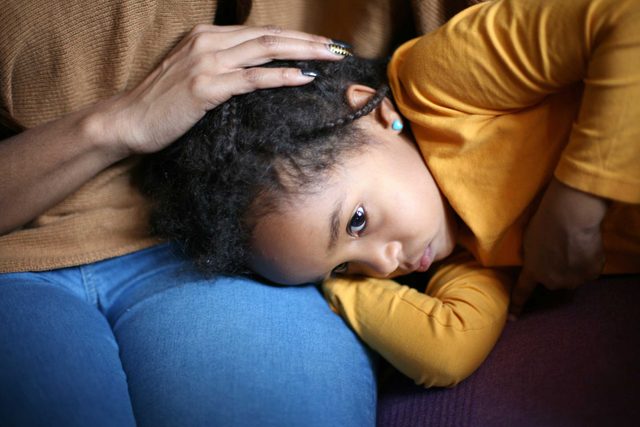
Frequent headaches and stomachaches
Headaches and stomachaches are common physical manifestations of the stress and anxiety associated with signs of bullying. They can also be ailments that are easy to fake as excuses to stay home from school and other social activities. If your child complains of these symptoms regularly, talk to them about it, suggests Bailey Lindgren, an associate at the Parent Advocacy Coalition for Educational Rights’ (PACER) National Bully Prevention Center. “We recommend saying something like, ‘You seem to be feeling sick a lot lately; can you tell me more about that?” Asking open-ending questions creates a non-confrontational space where you can discuss the root of the problem.
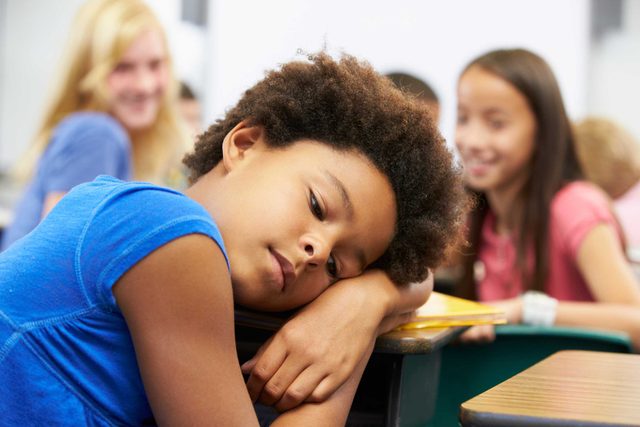
A change in friendships
Loss or changes in friends could be signs of bullying, especially in adolescent and teen girls. Similarly, a reluctance to hang out with friends could signal bullying is taking place within a friend group, says Clark-Love. “We see this a lot with ‘mean girls’ groups, and it’s often difficult for kids to recognize as bullying.” Parents can stay privy to shifts within their child’s group of friends by connecting with other parents in the group. That way, it’s easier to notice when a child is left out of birthday parties and events, or other group invites.

Troubled sleep
If a child is nervous or anxious about what might happen the next day at school or elsewhere, he or she could experience difficulty falling asleep, or anxious tossing and turning. “If a child seems more tired at breakfast or just looks more worn out than usual, those could be signs they’re having trouble sleeping at night,” says Lindgren. Exhaustion could also show up in other ways: An inability to focus or maintain proper hygiene can indicate anything from sleep issues to bullying and depression.
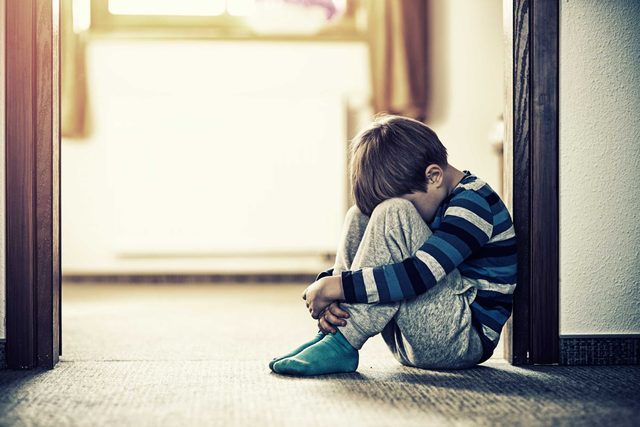
Crying spells or intense emotional reactions
If a child or teen has intense emotional reactions toward conversations about school or social activities, it could be a sign they’re holding anxiety around those events. “In younger kids, this tends to focus on discussions around school,” says Clark-Love. “Whereas, in high school they’ll become more emotional about Friday and Saturday nights.” Either way, you’ll notice an emotional jag, or an unwillingness to delve into the subject.
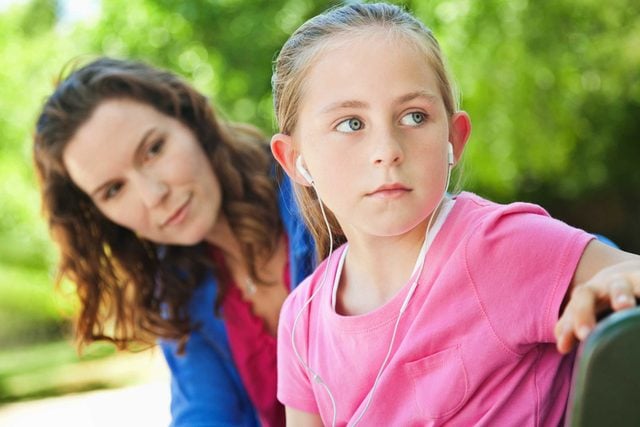
Not wanting to interact with the family
“If a child is not as talkative as they normally are, or if they go straight to their room after school, those could be things to look out for,” says Lindgren. Acting out against siblings could also be a sign of prolonged bullying; in some cases, a bullying victim will drop the “victim stance” and become reactive with siblings and other kids instead.

Obsession or withdrawal from devices
If a child’s bullying takes place online, you might notice one of two things: an over-attachment toward electronic devices, or a complete withdrawal from them. If it’s the former, the child could get agitated if you try and limit their usage. With the latter, you might find the child difficult to get ahold of (because they’ve withdrawn from their devices). Lindgren recommends setting up rules and guidelines for online engagement when kids first set up social media accounts. She says kids might be reluctant to tell adults about cyberbullying for fear their devices will be taken away. “You’ll want to show you’re not going to take these devices away,” she says,”but instead that you want to help solve the problem.”
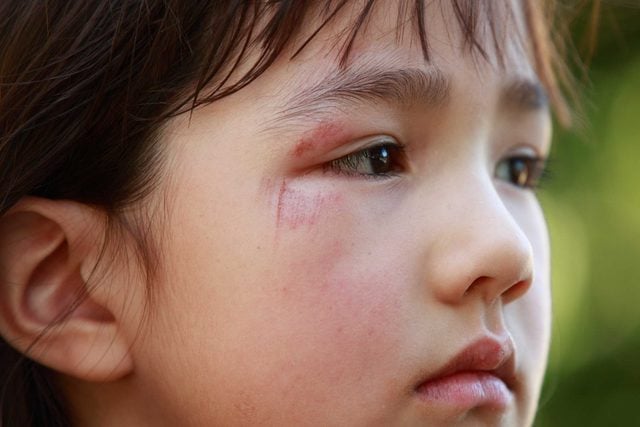
Torn clothing and physical marks
Inexplicably torn, ruined, or stolen clothes and belongings, along with physical scrapes or bruises, are trademark signs of playground bullying. “When the parents asks about these things, the child tends to either not be able to explain them, or not want to explain.” Again, ask open-ended questions: “What happened today at recess?”; “How did you feel when that happened?”.
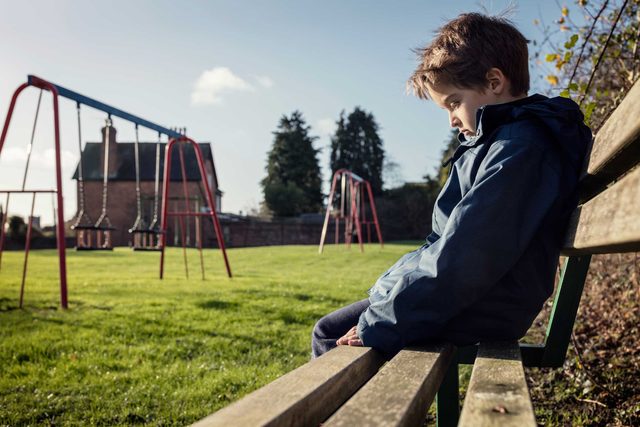
Take special note if your child is “the new kid”
Students without support systems are at the highest risk for bullying. That puts “new kids,” or recent transfers, at the top of the list. “It upsets me when schools don’t have an ambassador program for new students,” says Love-Clark. If your child is about to start at a new school, call and ask if the school can assign him or her a buddy. Even having one person the child can fall back on can help them assimilate more seemlessly with their new peers. Check out these 15 ways to beat school stress for you and your family.
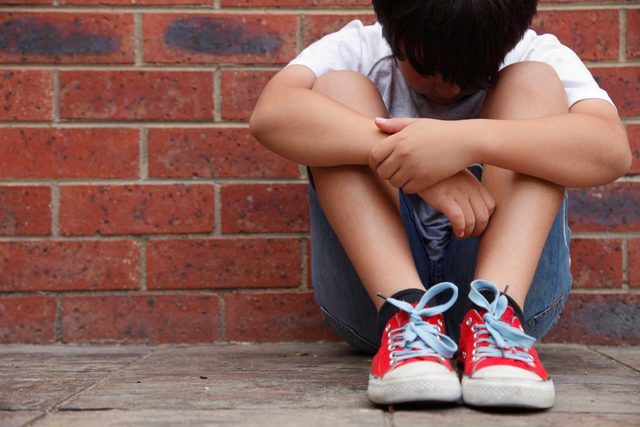
They’ve developed a “victim stance”
Clark-Love notes that “true victims,” meaning children who lack the skills or assertiveness to stand up for themselves, often acquire a victim stance: walking with their head down and being unwilling to comment or speak their mind. These children are also susceptible to being bullied year after year. If you child begins to embrace a meek stance, consider enrolling him or her in an activity that has no competition with other players, such as judo or martial arts. “Anything where the competition is themselves,” she says. That way, the child will be able to build confidence without the pressure of pleasing teammates. On the other end of the spectrum, here are the 10 warning signs your child is the bully.
